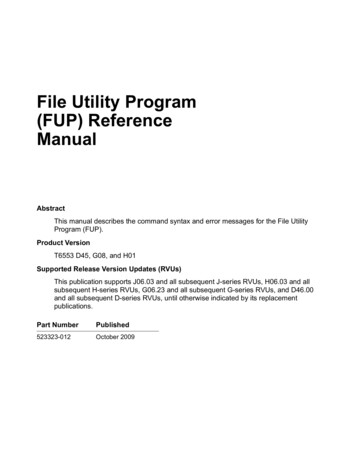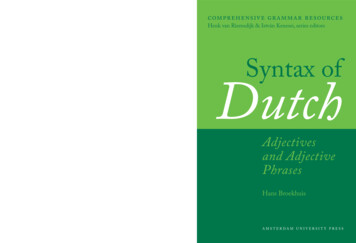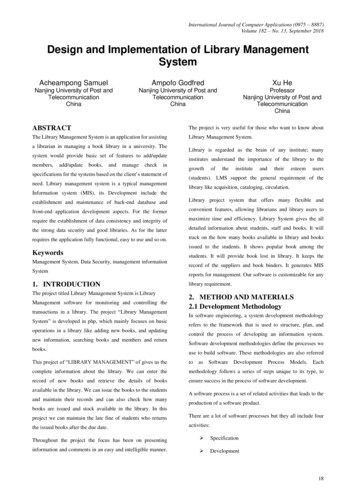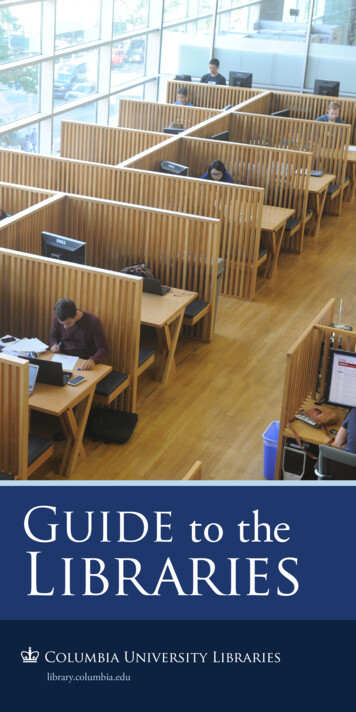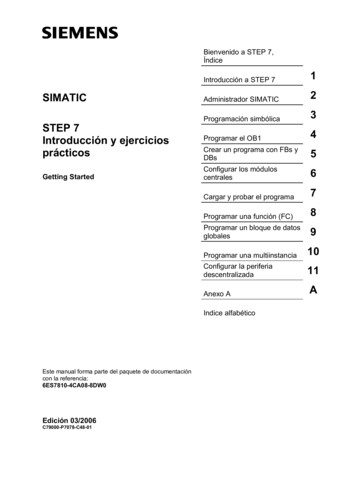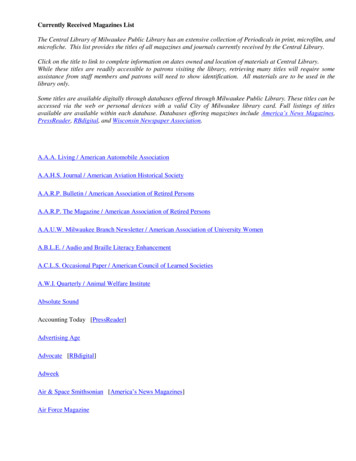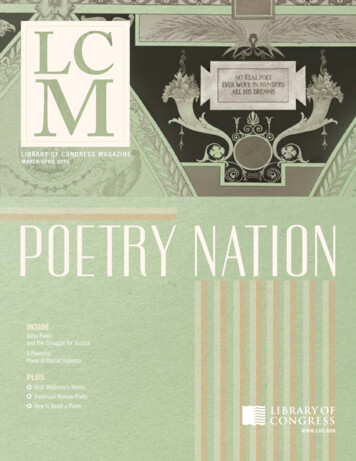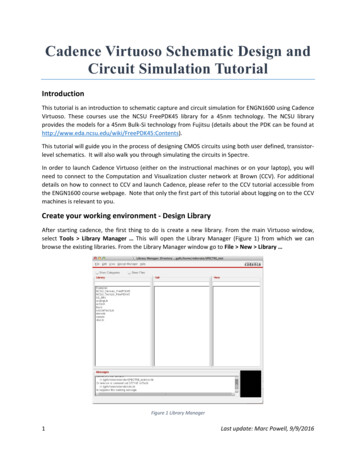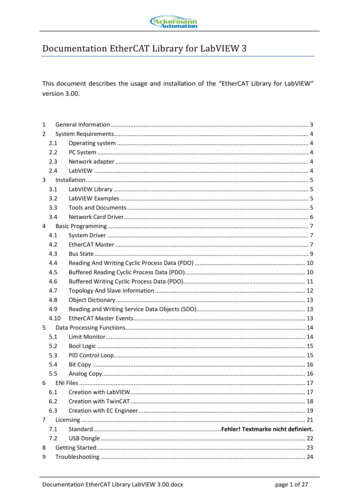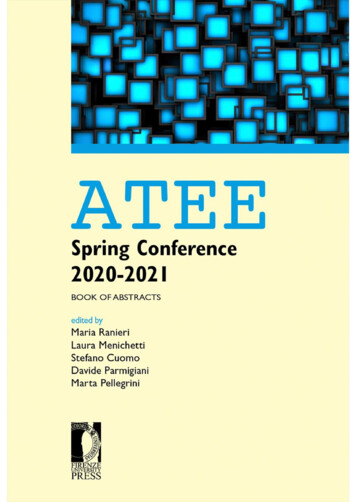
Transcription
ATEESpring Conference2020-2021BOOK OF ABSTRACTSedited byMaria RanieriLaura MenichettiStefano CuomoDavide ParmigianiMarta PellegriniFIRENZEUNIVERSITYPRESS
PROCEEDINGS E REPORTISSN 2704-601X (PRINT) - ISSN 2704-5846 (ONLINE)– 130 –
Abstracts double blind peer reviewedManaging EditorsLaura Menichetti, University of Florence, ITMarta Pellegrini, University of Florence, ITEditorial staffLuca Bravi, University of Florence, ITFrancesco Fabbro, University of Florence, ITElena Gabbi, University of Florence, ITCristina Gaggioli, University of Florence, ITDamiana Luzzi, University of Florence, ITAlice Roffi, University of Florence, IT
Chair of the conferenceMaria Ranieri, University of Florence, ITScientific CommitteeGianfranco Bandini, University of Florence, ITRaffaella Biagioli, University of Florence, ITGiovanni Biondi, INDIRE, ITVanna Boffo, University of Florence, ITGianna Cappello, University of Palermo, ITMiroslava Cernochova, Charles University, Prague, CZCornelia Connolly, University of Ireland Galway, IEGiovanna Del Gobbo, University of Florence, ITLoretta Fabbri, University of Siena, ITFloriana Falcinelli, University of Perugia, ITPaolo Federighi, University of Florence, ITPaul Hopkins, University of Hull, UKHiromi Kawaguchi, Hiroshima University, JPPanagiotis Kimourtzis, University of the Aegean, GRSirkku Kotilainen, University of Tampere, FIHanneke Jones, Newcastle University, UKErsilia Menesini, University of Florence, ITLaura Menichetti, University of Florence, ITT.J. Ó Ceallaigh, Mary Immaculate College, IEStefano Oliviero, University of Florence, ITMojca Pajnik, University of Ljubljana, SIDavide Parmigiani, University of Genoa, ITJohn Potter, University College London, UKJuliana E. Raffaghelli, Open University of Catalonia, ESMaria Ranieri, University of Florence, ITPaolo Raviolo, eCampus University, ITPier Cesare Rivoltella, Catholic University, ITPier Giuseppe Rossi, University of Macerata, ITBlerim Saqipi, University of Pristhina, XKClara Silva, University of Florence, ITOrganising CommitteeStefano Cuomo, University of Florence, ITMichiel Heijnen, ATEE Vice-PresidentLaura Menichetti, University of Florence, ITDavide Parmigiani, ATEE PresidentMaria Ranieri, University of Florence, ITMariagrazia Tagliabue, ATEE SecretariatCommunication staffIlariaAncillotti,UniversityWooJeonPark, Mathema,ITof Florence, ITWooJeon Park, Mathema, IT
ATEE Spring Conference 2020-2021Book of Abstractsedited byMaria Ranieri, Laura Menichetti, Stefano Cuomo,Davide Parmigiani, Marta PellegriniFIR ENZE UNIVERSITY PR ESS2021
ATEE Spring Conference 2020-2021 : book of Abstracts / edited by Maria Ranieri, Laura Menichetti, StefanoCuomo, Davide Parmigiani, Marta Pellegrini. – Firenze : Firenze University Press, 2021.(Proceedings e report ; 130)https://www.fupress.com/isbn/9788855184120ISSN 2704-601X (print)ISSN 2704-5846 (online)ISBN 978-88-5518-412-0 (PDF)ISBN 978-88-5518-413-7 (XML)DOI 10.36253/978-88-5518-412-0Graphic design: Alberto Pizarro Fernández, Lettera Meccanica SRLsFUP Best Practice in Scholarly Publishing (DOI https://doi.org/10.36253/fup best practice)All publications are submitted to an external refereeing process under the responsibility of the FUP Editorial Boardand the Scientific Boards of the series. The works published are evaluated and approved by the Editorial Board of thepublishing house, and must be compliant with the Peer review policy, the Open Access, Copyright and Licensingpolicy and the Publication Ethics and Complaint policy.Firenze University Press Editorial BoardM. Garzaniti (Editor-in-Chief), M.E. Alberti, F. Vittorio Arrigoni, E. Castellani, F. Ciampi, D. D’Andrea, A. Dolfi, R.Ferrise, A. Lambertini, R. Lanfredini, D. Lippi, G. Mari, A. Mariani, P.M. Mariano, S. Marinai, R. Minuti, P. Nanni, A.Orlandi, I. Palchetti, A. Perulli, G. Pratesi, S. Scaramuzzi, I. Stolzi.The online digital edition is published in Open Access on www.fupress.com.Content license: except where otherwise noted, the present work is released under Creative Commons Attribution4.0 International license (CC BY 4.0: de). This license allowsyou to share any part of the work by any means and format, modify it for any purpose, including commercial, as longas appropriate credit is given to the author, any changes made to the work are indicated and a URL link is providedto the license.Metadata license: all the metadata are released under the Public Domain Dedication license (CC0 1.0 /zero/1.0/legalcode). 2021 Author(s)Published by Firenze University PressFirenze University PressUniversità degli Studi di Firenzevia Cittadella, 7, 50144 Firenze, Italywww.fupress.comThis book is printed on acid-free paperPrinted in Italy
Table of contentsPreface13THEME 1Teaching critical media/digital literacy in multicultural societies15Content and Dynamics of Gender-Specific Behaviours in the Digital EducationalEnvironmentJeļena Badjanova, Dzintra Iliško, Svetlana Ignatjeva, Margarita Ņesterova,Mariana Petrova17Digital Storytelling, Video making and Media Education: an Experience ofUniversity TeachingFilippo Bruni21Utilising a Shared Critical Media Literacy Intervention to ChallengeStereotypical Representations of Minorities in the ClassroomMaria Campbell, Peter Stevenson25From Predictive Algorithms to Eudaimonia. A Critical Review on Legal, Ethicaland Pedagogical Issues in Educational Data ScienceClaudia Cavicchioli, Laura Menichetti29Digital History, Teaching and Social Inclusion in the United States ExperienceMonica Dati33Digital Artifacts as Cultural Machines: for an Intersectional Critical Analysis ofthe Relationship between Power and TechnologyMartina De Castro, Umberto Zona, Fabio Bocci37DigComp as a Theoretical Framework for Media Education. Issues andImplicationsAndrea Garavaglia, Livia Petti, Serena Triacca41Not Just Fun and Games: The Status-quo of Commercial Games in TeachingIda Kathrine Hammeleff Jørgensen, Michael S. Debus45Learners’ Spiritual Well-Being During the Pandemic in the Digital LearningEnvironmentDzintra Iliško, Jeļena Badjanova, Svetlana Ignatjeva, Diāna Dūna49Learning and Teaching Critical Skills: An Introduction to the CommonFramework of Reference for Intercultural Digital LiteraciesIlaria Moschini, Sandra Petroni53FUP Best Practice in Scholarly Publishing (DOI 10.36253/fup best practice)Maria Ranieri, Laura Menichetti, Stefano Cuomo, Davide Parmigiani, Marta Pellegrini (edited by), ATEE Spring Conference 2020-2021.Book of Abstracts, 2021 Author(s), content CC BY 4.0 International, metadata CC0 1.0 Universal, published by Firenze University Press(www.fupress.com), ISSN 2704-5846 (online), ISBN 978-88-5518-412-0 (PDF), DOI 10.36253/978-88-5518-412-07
8ATEE SPRING CONFERENCE 2020-2021Developing Computational Thinking Among Preservice TeachersMarta Peracaula-Bosch, Juan González-Martínez57Digital Competence and Critical Thinking in the Citizenship Education. NationalInvestigation and Didactic PerspectivesLoredana Perla, Laura Sara Agrati, Viviana Vinci, Alessia Scarinci61Art and Citizenship: Intercultural and Civic Soft Skills in the School Projects ofthe Triennial Plan of ArtsAlessia Rosa, Gabriella Taddeo65About University Teachers’ Transmedia ProfileAnna Sánchez-Caballé, Juan González-Martínez69Educating Digital Competence in Early Childhood. A Possible Model of ActionMaria Grazia Simone73Digital Contexts Mediated Communication Between Teachers and Parents: aTransversal Research in a Multicultural SchoolAlessandro Soriani, Elena Pacetti77Virtual Exchange in Teacher Education: New Challenges to Address SocialInjustice and Foster Gender EqualityRoberta Trapè81THEME 2Decommodifying teacher (digital) education85The Bridge Across, Not Over the Digital ‘Stream’: a Critical Digital MediaCourse for Pre-service TeachersPinar Ayyildiz87Developing Professional Digital Competence in Collaborative PartnershipsBetween Teachers and Teacher EducatorsStine Brynildsen, Halvdan Haugsbakken, Susanne Kjekshus Koch91Teachers' Experiences of Developing Professional Digital Competence byParticipating at TeachMeetsStine Brynildsen, Ilka Nagel, Irina Engeness95Quality Culture and Knowledge Management: Learning Analytics to ImproveEducation and Training ServicesGiovanna Del Gobbo, Glenda Galeotti998
9ATEE SPRING CONFERENCE 2020-2021Analytic Philosophy for a decommodified teacher training to codingMargherita Di Stasio, Beatrice Donati, Matteo Bianchini103Increased Legalisation and Reconfiguration of Education Into an InstrumentalCommodity State? New Challenges for Nordic TeachersEyvind Elstad107Dialectical Method and Theatre for the Training of Teachers in CitizenshipEducationFrancesco Fabbro, Colin Isham111Digital Learning Culture at School: How to Promote it (also) Without UsingTechnologyLaura Carlotta Foschi, Graziano Cecchinato115Challenges of Parents During Online Learning of Children in the PandemicPeriodRita Loloci119Challenges of Students’ Art Education in Digital Environment at the Faculties ofTeacher Education in CroatiaSvetlana Novaković, Jelena Blašković, Zlata Tomljenović123First Year University Students Digital Competence Self-PerceptionAnna Sánchez-Caballé, Mercè Gisbert-Cervera, Francesc Marc Esteve-Mon127Student Teachers’ Pedagogical Reasoning for Effective Technology IntegrationOttavia Trevisan, Marina De Rossi131SYMPOSIUM – Digital Technology, Education Policy and the Commodificationof SchoolsGianna Cappello, Juliana Elisa Raffaghelli, Elena Gabbi (discussant MariaRanieri)135THEME 3Digital technology and equity for inclusive teaching141The Local Context and the Curriculum. An Identity for the Small and RuralSchoolsAlessandra Anichini, Giuseppina Cannella, Rudi Bartolini143Non-Believers in School: Beyond the Social Stigma with Media Education andCritical ThinkingGianfranco Bandini1479
10ATEE SPRING CONFERENCE 2020-2021The Bridge21 Framework: Impact on Teachers and Implications for Equitable,Inclusive ClassroomsAibhín Bray, Jake Byrne, Brendan Tangney, Elizabeth Oldham151Case Study: Analysing Twitter Sentiment in the Context of Anti-BullyingCampaign #Neklusē (Don’t be silent!) in LatviaLinda Curika, Zanda Rubene155Innovative Approaches for the Inclusion of Each and Every OneGiuseppe Filippo Dettori, Barbara Lettieri159Analytic Philosophy for a Decommodified Teacher Training to CodingMargherita Di Stasio, Beatrice Donati, Beatrice Donati163Self-Assessment of Digital Competence at the End of University Studies:Outgoing Profile of Prospective TeachersFloriana Falcinelli, Mirko Susta167Technology-Enhanced Learning as a Driver of Inclusive Approaches: A CrossCase Analysis of Teacher Training ProgrammesLaura Fedeli171Toward a Broader Concept of Risky Play: Methods and Tools to EncourageRisk-Taking in ECEC and Primary School ContextDaniela Frison, Laura Menichetti175Applying the Bifocal Modeling Framework in the Italian School System:“Making-Science” with Special Needs StudentsTamar Fuhrmann, Lorenzo Guasti, Jessica Niewint, Livia Macedo179Reading Comprehension and Technologies for Students with DeafnessCristina Gaggioli, Moira Sannipoli183Inclusive Designing Through Educational Robotics. A Training Course for PreService Support TeachersFrancesca Gratani, Lorella Giannandrea, Alessandra Renieri187Presentations of Persons with Disabilities in Norwegian Textbooks for PrimarySchool. A Contribution to an Inclusive School?Marte Herrebrøden, Magne Skibsted Jensen, Rune Andreassen191Digital Technology and Equity for Inclusive TeachingDouha Jemai195Before and After the Lockdown: Analysis of the Perceptions of a Group ofStudents Involved in an Educational Robotics ProjectBeatrice Miotti, Daniela Bagattini19910
11ATEE SPRING CONFERENCE 2020-2021Moving Forwards: Using Search Tools on The ClassroomEmiliana Murgia, Monica Landoni, Theo Huibers, Maria Soledad Pera203Teachers’ Perceptions of their Technology Skills their use of Technology in theClassroom, and the Factors that Influence UseMoya O’Brien, Aisling Costello, Eileen Winter, Grainne Hickey207Can Digital Education Provide an Effective Bridge Between Formal and NonFormal Education? Experiences from Teachers and Youth WorkersConnie O’Regan, Bernadine Brady, Cornelia Connolly, Cliona Murray, PaulFlynn, Pat Dolan, Gerry Mac Ruairc211Pleiade: A Playful and Participatory Approach to Teacher ProfessionalDevelopment on Social InclusionDonatella Persico, Marcello Passarelli, Francesca Dagnino, FlavioManganello, Francesca Pozzi, Andrea Ceregini215Strategies for Integrating Students with Disabilities in Presence and DistanceLearningNatasha Poroçani, Manjola Lumani Zaçellari219On the relationship between ethics and simulations in teacher education in IsraelAmalia Ran223Build to learnMargherita Maria Sacco, Elena Liliana Vitti, Alberto Parola227Educational Technologies, Social and Emotional Learning and SchoolAlessia Signorelli231Making Sense of Collaborative Learning Practices in the ICTPED MOOCAmmar B. Singh235Pediatric Chronic Illness and School Experience: Technologies for PromotingHospital-School LinkLucrezia Tomberli, Andrea Smorti, Laura Vagnoli, Elena Amore, FrancescaMaffei, Enrica Ciucci239Teacher’s Thinking About Sensory Impairments and Technologies: AnExploratory Study Within a Specialisation CourseViviana Vinci24311
12
PrefaceThis book collects the abstracts of the ATEE Florence Spring Conference 2020-2021. The Conferencehas been organized by the Department of Education, Languages, Interculture, Literatures and Psychologyof the University of Florence, under the auspices of Association of Teacher Education in Europe (ATEE).Due to the insurgence of the COVID-19 pandemic, the Conference which was originally planned as a faceto-face event for May 2020, has been postponed to 28 th and 29th October 2021 and held completely online.Despite the challenges that schools and universities are experiencing for the digital transformation imposedby the epidemic condition, the Organising Committee decided to confirm the meeting, although only online,to give all authors the opportunity to engage a public discussion on the role of digital technologies in oursocieties to promote social justice and equal opportunities within the context of Teacher Education. Thiswas the main theme of the conference and the recent events corroborated the idea that a critical approachto the understanding of the implications of technological developments for education is needed today morethan ever. All in all, the abstracts included in this book refer to the main sub-themes of the Conference,namely:Teaching critical media/digital literacy in multicultural societiesResearch on media and digital literacy has emphasised the potential of education to foster the criticalunderstanding of the relationships between media, information and power, particularly referring to themedia (mis)representation of – and the (online) hate speech against – historically marginalizedcommunities, as well as to the underlying ideologies that naturalise – or question – discrimination and socialinjustice in the wider society. To what extent – and how – teacher training and education may reflect andincorporate critical media/digital literacy to prepare teachers to teach in multicultural contexts?Decommodifying teacher (digital) educationMany practices and discourses of “digital education” nourish a wider process of reconfiguration ofeducation into a commodity state, which strongly contrasts with the notion of education as a collectivepublic good. Technology giants are reshaping the very nature of schooling on a vast scale. Through theirphilanthropic presence in schools, they are influencing the subjects teachers teach, the tools they use, andthe learning models they adopt. How can teacher education and training about educational technologyand/or media literacy critically approach the commodification of school education?Digital technology and equity for inclusive teachingDevelopments in the area of Information and Communication Technologies (ICT) do not necessarilycorrespond to an increase of access, participation and learning. Data on the impact of ICT on socialinclusion in a large sense are still controversial. However, some positive results have been found on the useof digital technologies to design inclusive teaching, especially when it is combined with approaches todesign inspired by principles such as Universal Design for Learning. How to prepare future and in-serviceteachers to design digital inclusive teaching? What impact may teacher education about digital technologyhave on teachers’ capacity to design learning for all?We thank all keynote speakers for having confirmed their participation, despite the uncertainty thataccompanied the organization of the event. We are also greatly indebted to the referees, for the time spentin reviewing the abstracts, and the chairs of sessions who supported the delivery of Conference nurturingand moderating the discussion within the panels. Special thanks are finally due to the members of theOrganising Committee, and all the bodies that collaborated for ATEE Florence Spring Conference 20202021. Last but not least, we thank all the authors and participants, without whom the conference would nothave been possible.Chair of the ConferenceFUP Best Practice in Scholarly Publishing (DOI 10.36253/fup best practice)Maria Ranieri, Laura Menichetti, Stefano Cuomo, Davide Parmigiani, Marta Pellegrini (edited by), ATEE Spring Conference 2020-2021.Book of Abstracts, 2021 Author(s), content CC BY 4.0 International, metadata CC0 1.0 Universal, published by Firenze University Press(www.fupress.com), ISSN 2704-5846 (online), ISBN 978-88-5518-412-0 (PDF), DOI 10.36253/978-88-5518-412-013
14
THEME 1Teaching critical media/digital literacyin multicultural societies
Content and Dynamics of Gender-Specific Behaviours in the DigitalEducational EnvironmentJeļena Badjanovaa, Dzintra Iliškob, Svetlana Ignatjevac, Margarita Ņesterovad, Mariana PetrovaeDaugavpils University, Daugavpils (Latvia), jelena.badjanova@du.lvb Daugavpils University, Daugavpils (Latvia), dzintra.ilisko@du.lvc Daugavpils University. Daugavpils (Latvia), svetlana.ignatjeva@du.lvd Daugavpils University, Daugavpils (Latvia), margarita.nesterova@du.lve St. Cyril and St. Methodius University of Veliko Tarnovo, Veliko Tarnovo (Bulgaria), mm p@abv.bgaKeywords: Information and Communication Technologies, Gender-Specific Behaviours, Early Maturity, MidMaturity.1. Introduction and Social Aspects of the Topicality of the ResearchDuring the period social distancing, an increasing number of people use communication applications,various types of digital tools and programs. Various video conferencing platforms are regularly used in theeducational environment. The study presents an analysis of how intensive is the use of Information andCommunication Technologies (ICT) in the educational environment and how it can change cognitivebehavioral gender differences. It is particularly important to pay special attention to the analysis of genderas a dynamic category, to take into account the processes of gender socialization and transformation ofgender identification in the changing social environment.The ambiguous evidence on differences between the biological sex and gender role require furtherresearch. Therefore, the theoretical foundation of the study is based on both, the classical theories and theresults of recent studies on some aspects of gender differences and similarities.Kohlberg (Kohlberg, 1966) in his theory of cognitive development (cognitive-developmental theory)argued that all information relating to gender-specific behaviour is reflected in our consciousness in theform of gender schemes. Maccoby and Jacklin (1974), as well as Bem (1974) stated that the main featureof a gender is the behavioural aspects pertaining to a certain social gender, regardless of the biological sex:gender-specific behaviour patterns are acquired during a person’s lifetime and they are typical of aparticular culture or society. The authors claim that a set of norms containing general information on thecharacteristics of each sex is what can be termed as gender roles. S. Bem believes that population growth,mechanization of manufacturing and economic crises has led to a situation when it becomes more and moredangerous for men to determine their value according to their financial opportunities. By insisting on seeingthis quality as typically male, we doom most men to failure. According to the author, traditional roles innowadays society obviously do not function properly. Thus, it can be argued that, in the social model ofmale and female gender-specific behaviours,Bem attempts to find a way to help a person get rid of the restrictions which are imposed on the behaviour and psychology of men and women by the traditional stereotypic thinking and which, in essence, aremerely a conditional attribution to one or the other sex. Many aspects of Bem’s theory comprise theregularities of the manifestations of femininity, masculinity and androginity.In Europe and all over the world, researchers have studied the impact of sex, age and gender differences on self-efficiency and decision making (Jaradat, Imlawi, & Al-Mashaqba, 2018). There was anincreased interest in exploring the potential for the use of IT technologies to determine the cognitivebehavioural gender differences (Teo, Fan, & Du, 2015; Bernik, Vusić, & Milković, 2019). Likewise, thecognitive aspects in the field of education were frequently studied. For instance, many researchersFUP Best Practice in Scholarly Publishing (DOI 10.36253/fup best practice)Maria Ranieri, Laura Menichetti, Stefano Cuomo, Davide Parmigiani, Marta Pellegrini (edited by), ATEE Spring Conference 2020-2021.Book of Abstracts, 2021 Author(s), content CC BY 4.0 International, metadata CC0 1.0 Universal, published by Firenze University Press(www.fupress.com), ISSN 2704-5846 (online), ISBN 978-88-5518-412-0 (PDF), DOI 10.36253/978-88-5518-412-017
18ATEE SPRING CONFERENCE 2020-2021(Okagbue et al., 2020) have found that the lack of significant gender differences means that the effect ofthe phenomenon under study is the same for both, men and women. If the study frequency is the same,regardless of the student’s age and gender, it means that the students demonstrate the same patterns of behaviour regarding the study frequency. There is no gender difference in preference of a certain type ofstudy, yet there is an age difference. Likewise, gender and age are not related to the study environment. Innumerous research, the proposed methodologies for researching self-learning with adolescents may beobserved more frequently: whether the age and sex have an impact (Schweder & Raufelder, 2019). Remarkable research was conducted in the field of communication (Pierce & Thompson, 2018). Explainingthe differences between men and women in using unethical tactics for negotiation. The stability of thisethical difference served as a reason for many studies that focused on why men more frequently than womentend to use unethical methods in negotiation. Widespread responses to both answers share a common theme:a compromise between caring for oneself and others. Overall, the results confirmed that competition andempathy are constituents of the gender constructs. Despite the credible assumption that there are genderdifferences in social affiliation, different studies yield ambiguous results.For instance, arguing that the female, emotionally oriented decision is associated with a higher levelof depression than the male, problem-oriented decision. The women who are more feminine and accepttraditional female gender roles have a lower self-esteem, consider stressful occurrences more unpleasant aswell as are more prone to yield to group pressure. Androgynous women displaying some male traits areless subject to stress and experience a higher level of psychological wellbeing. Likewise, androgynouspersons are more sensitive to minute differences between specific stressful occurrences, which reflects in amore flexible use of various strategies and their ability to distinguish effective survival strategies. Inaddition, their flexible pattern of strategies is more prudent than casual. Besides, androgynous behaviouralso accounts for a lower level of social alarm (Prakash et al., 2010).The modern world is changing faster than ever. The processes of integration and globalisation enablepeople to travel easily around the world, work or study outside their home country. Oftentimes, peopleembark on a new life, not only geographically, but also culturally distanced from previous traditions. Theglobal migration presupposes either living in a different cultural context or in a multicultural society,behaving in accordance with cultural models or rules that are binding to this society. There are differentbehavioural models in each culture (Kimmel, 2000).While the definition of a particular role may depend on a culture, we can surmise that since genderroles are preserved through socialization processes, they rarely undergo any material changes. Therefore,the authors of the present article, due to a close cooperation with one of the Bulgarian universities, decidedto carry out identical studies.The focus of modern science is on an individual’s cognitive-behavioural interactions, as well as on thecognitive-behavioural-gender interactions. In order to analyse the concept of gender in detail, differenttheories and approaches are described in general, as well as the views of various psychologists and au- thorsof scientific studies in the field of social psychology.In their previous studies, the authors of the present paper have already explored the similarities anddifferences of gender-specific behaviours of the residents of Latvia in the age groups of youth, early andmid-maturity. Likewise, the socio-cultural factors that might contribute to the Latvian and Bulgarian residents’ motivation for success across various age and gender groups have also been studied.The dominant research result showed the dynamics of the androginity phenomenon, regardless of ageand gender, which has been increasingly debated in today’s society. The basic assumption of recent studies is the following: the perspective of gender (behavioural) roles is that a person can behave in a traditionally masculine or traditionally feminine manner depending on the current situation, limitations andneeds and yet remain in accordance with one’s biological sex – either male or female. Consequently, theandroginity phenomenon is a good indicator of an individual’s psychological adaptation. Consequently, themain aim of this research is to explore gender-specific behaviours of Bulgarian students and teachers in thedigital educational environment.18
19ATEE SPRING CONFERENCE 2020-20212. The research methodologyQualitatively quantitative methodology was used to conduct the present research. The gender andgender identity studies are a particularly topical issue in experimental psycholo- gy. The reason for that islack of a uniform diagnostic tool. The situation is even more complicated by the fact that although the topicis well researched, these studies mainly focus merely on exploring the differences in thinking, memory,behaviour and communication. In the course of the empirical study conduct- ed during the 2019-2020period, quantitative methodology was applied using an adapted S. Bem’s Sex-Role Inventory (BSRI)survey. The study involved 150 respondents in the early and mid-maturity age groups (20-60 year olds).The authors of the present paper also used different methods to research gender-specific behaviouraldifferences in their studies. However, S. Bem’s BSRI methodology has been most effective so far.Data were processed using the SPSS (Statistical Package for the Social Science) 20.0 software version.Methods of statistical data analysis: for testing the reliability and coherence of the indicators, for determining the distribution of results, for analysis of the variance of results, the parametric one-factor analysisof variance (ANOVA), descriptive statistics.The research methods also included a set of additional methods, such as a focus group on different aspects of gender-specific behavior in the digital learning environment, putting together collages, as well asthe method of the unfinished sentence related to the impact of ICT on teachers’ professional developmentand well-being.The following questions were raised: (1) What are male and female gender-specific behaviours in theearly and mid-maturity age groups of students and teachers who intensively use Information and Communication Technologies (ICT) in the educational environment? (2) Are there any similarities and differences between the male and female gender-specific behaviours in the early and mid-maturity ages?3. ResultsAs a result of the empirical research, the essence of male and female gender-specific behaviour wasdetermined. On the grounds of the obtained survey results, the content and dynamics of gender-specificbehaviours of Bulgarian males and females were interpreted in the early and mid-maturity age groups.Masculinity and Femininity scales were measured. A rather high Androginity index for both, men andwomen were determined in early and mid-maturity age groups.There are no differences in the views of students and teachers on the effectiveness of the use of ICT inthe educational environment, regardless of the gender of the respondents. However, the age of therespondents is what makes a difference: the older the respondents, the more likely they are eager to learnmore about new things in order to cover the shortcomings of previous years or in order not to lose the job.It can be concluded that students and teachers are satisfied with the use of ICT in the educationalenvironment.4. Conclusions/DiscussionConsidering the obtained results of our study, it may
A Critical Review on Legal, Ethical and Pedagogical Issues in Educational Data Science Claudia Cavicchioli, Laura Menichetti . Education and Training Services Giovanna Del Gobbo, Glenda Galeotti 99 . ATEE SPRING CONFERENCE 2020-2021 9 . Students Involved in an Educational Robotics Project Beatrice Miotti, Daniela Bagattini 199 . ATEE SPRING .
